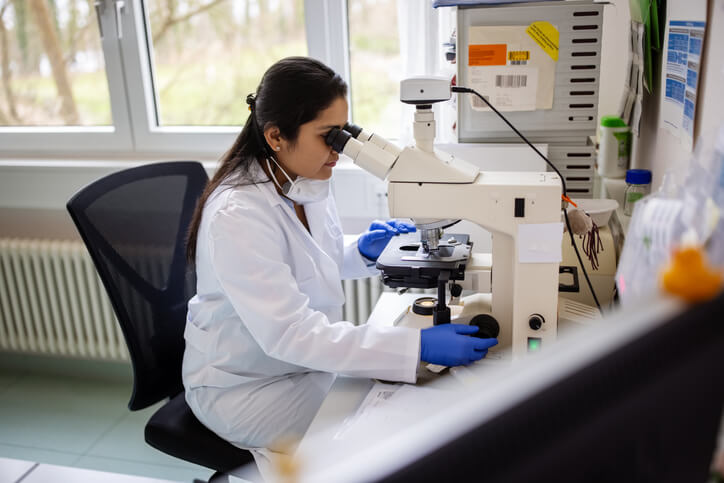
What jobs can I get in biotechnology?
Medical advances have fueled a rise in biotech jobs. Learn more about careers where you can save lives and advance human knowledge.
By: Thomas Broderick, Edited by: Rebecca Munday
Published: June 13, 2025

In 2020, the world witnessed the power of biotechnology as companies developed the first COVID-19 vaccines in fewer than 12 months. This accomplishment brought biotech's potential to cure or prevent other diseases into the spotlight.
Explore biotech jobs where you can help people live healthier lives, protect the environment, and discover the next generation of lifesaving drugs.
Biomedical engineers
Noninvasive surgery, portable life support systems, and advanced drug delivery systems would not exist without biomedical engineers. These professionals have a mastery of chemical and electrical engineering, materials science, and computer science principles to help them research and develop cutting-edge medical equipment and processes.
Over half of biomedical engineers work for a research and development firm, medical equipment supply company, or commercial equipment company, according to the Bureau of Labor Statistics (BLS).
- BLS median annual salary (2024): $106,950
- BLS projected job growth (2023-33): 7%
- Required education: Bachelor's degree in a STEM-related field. A graduate degree may be required for professional advancement.
Agricultural engineers
Agricultural engineering may streamline food production, test water and soil quality, and develop new agricultural equipment. These and other responsibilities help increase crop yields while preserving the environment. Agricultural engineers typically split their time between the office and the field.
- BLS median annual salary (2024) $84,630
- BLS projected job growth 2023-33: 8%
- Required education: Bachelor's in agricultural or biological engineering degree from an ABET-accredited program.
Agricultural and food scientists
You can trust it's safe to eat the food you buy at the grocery store because of agricultural and food scientists. These professionals research food storage methods, develop new food manufacturing techniques, and help food manufacturers meet changing consumer demands. They typically work in a traditional office, laboratory, or the field.
- BLS median annual salary (2024): $78,770
- BLS projected job growth (2023-33): 8%
- Required education: Bachelor's in agriculture or a related field. Many professionals enroll in a land-grant college, which exists to expand learning in agriculture.
Medical scientists
Medical scientists run clinical trials to test the latest medicines and medical devices. These trials determine whether a medication or device improves well-being and provides more benefits than harmful side effects for most people. Medical scientists work alongside physicians, manufacturers, and patients, often in research and development or at a hospital.
- BLS median annual salary (2024): $99,770
- BLS projected job growth (2023-33): 11%
- Required education: Doctor of philosophy (PhD) or doctor of medicine (MD).

Microbiologists
In a lab, microbiologists perform basic or applied research on microscopic organisms, such as bacteria, fungi, and viruses. Depending on their employer, they may oversee extensive research studies or work alongside physicians to cure patients. Other responsibilities may include supervising clinical laboratory technologists.
Most microbiologists work in research and development, helping pharmaceutical companies develop the next generation of lifesaving drugs.
- BLS median annual salary (2024): $87,330
- BLS projected job growth (2023-33): 7%
- Required education: Bachelor's in biology; some roles may require a master's or doctorate for career advancement.
Biochemists
Biochemists use their health science, chemistry, and biology expertise to study chemical reactions. They spend much of their time performing research in a lab. Senior-level biochemists may run departments and present their findings at conferences. Over half of biochemists work in research and development, with others employed by universities, per BLS data.
- BLS median annual salary (2024): $103,650
- BLS projected job growth (2023-33): 9%
- Required education: PhD in biochemistry.
Clinical laboratory technologists and technicians
Clinical laboratory technologists and technicians run tests on biological samples to help physicians diagnose patients' medical conditions. Other responsibilities include maintaining lab equipment and mentoring less-experienced staff.
Almost half of these professionals work in hospitals, medical offices, or diagnostic laboratories, according to BLS data from 2023.
- BLS median annual salary (2024): $61,890
- BLS projected job growth (2023-33): 5%
- Required education: Technician roles typically require an associate degree in natural sciences. Some roles may require you to hold a bachelor's degree and earn state licensure.
Biological technicians
Like clinical laboratory technologists and technicians, biological technicians perform tests on biological samples. However, according to BLS, most work solely in research laboratories; only about 8% work in clinical settings. Day-to-day responsibilities may include applying scientist guidance, working as a team, and entering results into a computer model.
Major employers of biological technicians include research and development firms, colleges, and federal government agencies.
- BLS median annual salary (2024): $52,000
- BLS projected job growth (2023-33): 7%
- Required education: Bachelor's in biology or a related field.